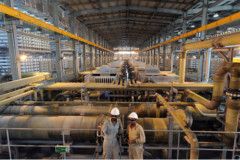
Muscat: A protracted water supply crisis that had plagued a populous suburb of the capital city of Muscat has been finally resolved, a top official of Oman’s principal water utility body announced on Tuesday.
Dr Ali Bin Hamad Al Ghafri, Assistant Chairman for International Relations at the Public Authority for Electricity and Water (PAEW), said potable water was being channelled some 250 kilometres from the industrial port city of Sohar to address the water crunch in Seeb, one of the largest and most populous districts that make up the capital region of Muscat.
For the last three weeks, residents of Seeb had to contend with a supply shortfall that threatened to develop into a full-blown crisis. At one point, local elected representatives had sought to summon the head of the PAEW before the Shura Council for clarity on the efficacy of solutions employed by the Authority in tackling the situation. They had also appealed for the deployment of the National Committee for Civil Defence in easing the shortage.
At the root of the problem, which first erupted on April 4, is a demand-supply mismatch, attributed to runaway residential and commercial development in the Seeb district, say officials. Low supply pressure has meant that residents occupying the upper floors of apartment blocks have had to make do with a trickle or nothing at all. Adding to their woes, private operators of mobile tankers have been charging huge premiums to supply water-starved residents.
The situation was exacerbated earlier this week when one of the main desalination plants supplying water to the capital city reported a busted water pipe at its facility at Barka. The plant remained shut for two days to allow for workers to replace the damaged pipe, resulting in reservoirs being further depleted.
Now, with the rerouting of potable water from Sohar, the three-week-long supply crisis is on course to being fully resolved, said Dr Al Ghafri. Around 13 million gallons of desalinated water is being pumped daily from Sohar to the network that feeds Muscat and the surrounding districts, he said. Until normality in supply is restored over the next 24 hours or so, private tanker operators on contract with the Authority will supply affected areas, he stated.
Potable water demand has soared dramatically in the Sultanate on the back of strong urban development fuelled by energetic economic growth, say PAEW officials. The total number of customers served by a number of utilities operating in the Sultanate has more than doubled from around 150,000 in 2007 to 380,000 at present, it is learnt.












